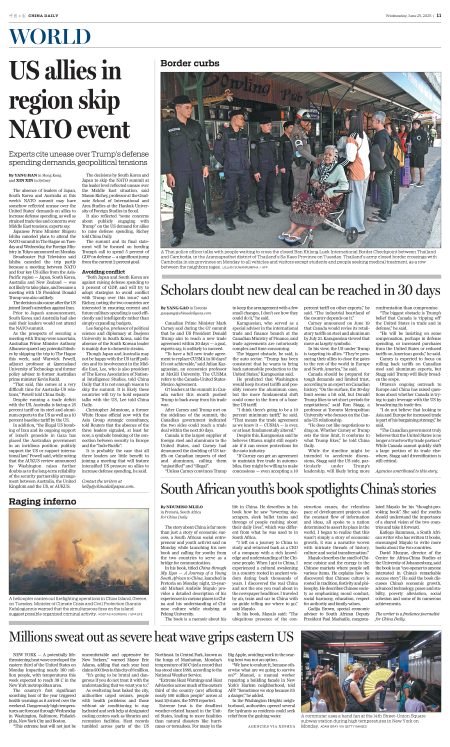Canadian Prime Minister Mark Carney said during the G7 summit that he and US President Donald Trump aim to reach a new trade agreement within 30 days — a goal, experts say, is unlikely to succeed.
"To have a full new trade agreement to replace CUSMA in 30 days? It's not achievable," said Julian Karaguesian, an economics professor at McGill University. The CUSMA refers to the Canada-United States-Mexico Agreement.
G7 leaders at the summit in Canada earlier this month pushed Trump to back away from his trade war.
After Carney and Trump met on the sidelines of the summit, the Canadian government indicated the two sides could reach a trade deal within the next 30 days.
Canada is the largest supplier of foreign steel and aluminum to the United States, and Carney had denounced the doubling of US tariffs on Canadian imports of steel and aluminum, calling them "unjustified" and "illegal".
"Unless Carney convinces Trump to keep the arrangement with a few small changes, I don't see how they could do it," he said.
Karaguesian, who served as a special adviser in the international trade and finance branch at the Canadian Ministry of Finance, said trade agreements are notoriously complex and time-consuming.
The biggest obstacle, he said, is the auto sector. "Trump has been consistent that he wants to bring back automobile production to the United States," Karaguesian said.
He predicted that Washington would keep its steel tariffs and possibly remove the aluminum ones, but the more fundamental shift could come in the form of a baseline US tariff.
"I think there's going to be a 10 percent minimum tariff," he said. "That means the trade agreement as we knew it — CUSMA — is over, or at least fundamentally altered."
Despite this, Karaguesian said he believes Ottawa might still negotiate if it can secure protections for the auto industry.
"If Carney can get an agreement to maintain free trade in automobiles, they might be willing to make concessions — even accepting a 10 percent tariff on other exports," he said. "The industrial heartland of the country depends on it."
Carney announced on June 19 that Canada would revise its retaliatory tariffs on steel and aluminum by July 21. Karaguesian viewed that move as largely symbolic.
In his view, the US under Trump is targeting its allies. "They're pressuring their allies to close the gates to the rest of the world in Europe and North America," he said.
Canada should be prepared for tough demands and limited trust, according to an expert on Canadian history. "On the surface, the 30-day limit seems a bit odd, but Donald Trump likes to set short periods for negotiations," said Ron Stagg, a professor at Toronto Metropolitan University who focuses on the Canada-US relationship.
"He does not like negotiations to drag on. Whether Carney or Trump sets the time limit, it conforms to what Trump likes," he told China Daily.
While the timeline might be intended to accelerate discussions, Stagg said the US side, particularly under Trump's leadership, will likely bring more confrontation than compromise.
"The biggest obstacle is Trump's belief that Canada is 'ripping off' the United States in trade and in defense," he said.
"He will be insisting on some compensation, perhaps in defense spending, or increased purchases from the United States or reduced tariffs on American goods," he said.
Carney is expected to focus on rolling back tariffs on Canadian steel and aluminum exports, but Stagg said Trump will likely broaden the scope.
Ottawa's ongoing outreach to Europe and China has raised questions about whether Canada is trying to gain leverage with the US by broadening its trade ties.
"I do not believe that looking to Asia and Europe for increased trade is part of his bargaining strategy," he said.
"The Canadian government truly believes that the United States is no longer a trustworthy trade partner." While Canada cannot quickly shift a large portion of its trade elsewhere, Stagg said diversification is still critical.
Agencies contributed to this story.
gaoyang@chinadailyusa.com

